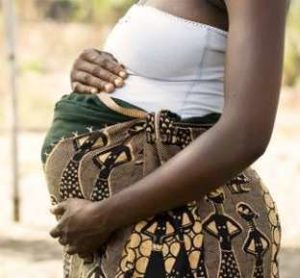Teenage Pregnancy in Upper East rises above national target
 Madam Rofina Asuru, the Upper East Regional Deputy Director of Nursing Services (DDNS) in charge of Public Health activities says the region has exceeded the national target of 12 per cent teenage pregnancy cases.
Madam Rofina Asuru, the Upper East Regional Deputy Director of Nursing Services (DDNS) in charge of Public Health activities says the region has exceeded the national target of 12 per cent teenage pregnancy cases.
“We are doing higher than the national target of 12 percent. For the year 2018, we recorded a percentage of 15.8 of the proportion of pregnant women as teenagers who visited our health facilities.”
Madam Asuru disclosed this in an interview with the media in Bolgatanga on the sidelines of the Upper East Regional health sector performance review meeting for 2018.
She said the region is not doing too well to prevent teenagers from getting pregnant, and mentioned Talensi, Nabdam, Bongo, Builsa South, Bawku West and Kassena-Nankana West as Districts in the Region that contributed to the high percentage rate of the teenage pregnancies recorded.
Madam Asuru disclosed that, Nabdam District recorded 21 percent of teenage pregnancies, Bongo 20.6 percent, Builsa South 18.7 percent, Bawku West District 19.7 percent, and Kassena-Nankana West recorded 16.6 percent.
“These are the Districts contributing to the high teenage pregnancy rates in our region.”
The review was on the theme: “Achieving Sustainable Development Goals for Maternal and Child Health – the Role of Technology.”
Asked why the prevalence was high in these Districts, the DDNS said it was partly because there were no opportunities in the rural areas compared to the urban ones.
“Families are poor, they are unable to support the education of their teenage girls, so, many of them will drop out of school and if they are not involved in any skilled training, the next thing is to get married,” she added.
Madam Asuru said there is the urgent need for an all inclusive approach to reversing the phenomenon. “Everybody should be involved, you the media is one partner that we look forward to educate people about the issues and what we can do collectively. I think we need to pay more attention to that.”
She observed that at the family level, parents were “chasing their daily bread, so they are not really taking care of the girls. Some parents leave home early, they come late, they do not even care to know what has happened in their absence.”
She entreated parents to be more responsible and take care of their children, especially the girls.
Madam Asuru described as “unfair criticisms” from some members of the public who blame the Ghana Health Services for not stepping up its mandate to educate the girls in basic schools on reproductive and family planning issues to avert the occurrences of teenage pregnancies.
“We have always tried. One challenge we have is with the Ghana Education Service (GES), they do not feel comfortable about we talking about contraceptive use for those who cannot abstain. We know that the children engage in sexual activities.”
Madam Asuru said from the Ghana Demographic and Health Survey, about 22 per cent of the population are within the age group of 10 to 19, “So if we have that cohort and they are not productive, you can see that with time we are just going to be a stint, because our future leaders are not going to get any better life.”
Source: GNA
